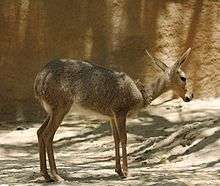Grey rhebok
| Grey rhebok | |
|---|---|
 | |
| A female at the San Diego Zoo | |
| Scientific classification | |
| Kingdom: | Animalia |
| Phylum: | Chordata |
| Clade: | Synapsida |
| Class: | Mammalia |
| Order: | Artiodactyla |
| Family: | Bovidae |
| Genus: | Pelea Gray, 1851 |
| Species: | P. capreolus |
| Binomial name | |
| Pelea capreolus (Forster, 1790) | |
The grey rhebok or grey rhebuck (Pelea capreolus), locally known as the Vaal rhebok or Vaalribbok in Afrikaans, is a species of antelope endemic to South Africa, Zimbabwe, Lesotho, and Swaziland. The specific name capreolus is Latin for 'little goat'.
Description
The grey rhebok is a medium-sized antelope weighing 19–30 kg (42–66 lb) with a long neck, narrow ears, and straight, sharp horns in the male. The horns are ringed at the base and are around 15–25 cm (6–10 in) long.[2] Only the males carry the straight horns. The coat is short and dense and coloured in various shades of grey.
Distribution and habitat
Confined to the higher areas of Southern Africa, they typically inhabit grassy, montane habitats - for example, sourveld - usually 1000 m above sea level, and carry a woolly grey coat to insulate them from the cold. However, they are not strictly limited to this habitat as they can be found in the coastal belt of the Cape, almost at sea level.[2]
Reproduction and behaviour
The grey rhebok is territorial and maintains its territory by urinating and defecating, standing or walking in an upright posture, and patrolling. Males become extremely aggressive during the breeding season. The grey rhebok usually aggregates in herds of one to 15 females and young and one mature male. This species is therefore polygynous. The grey rhebok is a seasonal breeder,[2] with mating taking place between January and April. Females are pregnant for about seven months, and give birth to a single calf in late spring and summer (November to January in the Southern Hemisphere).
Conservation status
The grey rhebok is listed as Least Concern,[1] with the population estimated to be at least 9,800 individuals and perhaps as many as 18,000. The uncertainty regarding the exact number is due to extensive areas of the species' range not having been surveyed or where estimates are unavailable.
In contemporary culture
The Dutch spelling of the species, reebok (a mature male ree), lends its name to the British sportswear manufacturing company Reebok.[3]
References
- 1 2 IUCN SSC Antelope Specialist Group (2008). "Pelea capreolus". IUCN Red List of Threatened Species. Version 2008. International Union for Conservation of Nature. Retrieved 5 April 2009. Database entry includes a brief justification of why this species is of least concern.
- 1 2 3 Estes, Richard Despard. The Behaviour Guide to African Mammals. University of California Press. p. 111. ISBN 978-0-520-27297-2.
- ↑ Sneakers: brands
